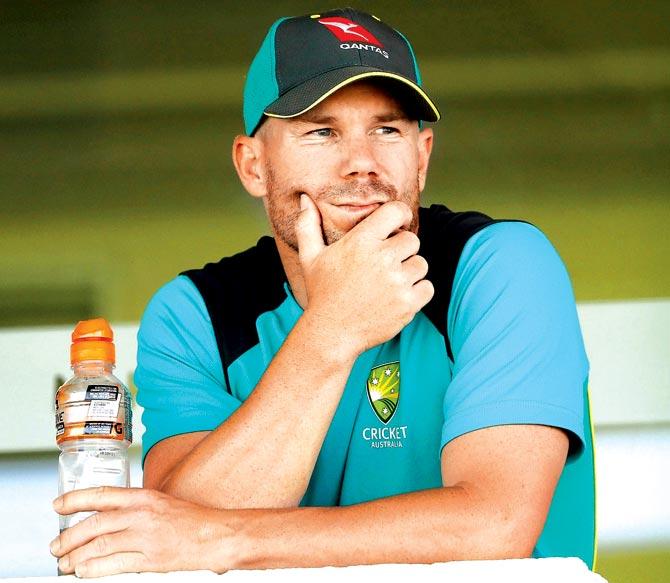Had David Warner not been stopped by his colleagues, there would have been blows exchanged near the Kingsmead dressing rooms


Australia's David Warner is skating on thin ice where his behaviour is concerned
ADVERTISEMENT
 Two great Test sides are competing in South Africa. Yet, the series does not exactly make for pleasurable following because the needle between both teams seems to be one of hatred rather than competitiveness. Australia's David Warner loses his mind to such an extent that he threatens to attack Proteas' wicketkeeper Quinton de Kock as he heads to the privacy of the Durban dressing room.
Two great Test sides are competing in South Africa. Yet, the series does not exactly make for pleasurable following because the needle between both teams seems to be one of hatred rather than competitiveness. Australia's David Warner loses his mind to such an extent that he threatens to attack Proteas' wicketkeeper Quinton de Kock as he heads to the privacy of the Durban dressing room.
In the following Test at Port Elizabeth, South Africa pacer Kagiso Rabada, already smudged with demerit points, brushes shoulders with Australia captain Steve Smith after dismissing him, and ends up getting banned for two games. While Rabada insists he didn't make contact with Smith on purpose (though match referee Jeff Crowe says it was 'inappropriate and deliberate'), Warner claims to have been provoked by De Kock as he entered the pavilion.
South Africa captain Faf du Plessis didn't hesitate to speak his mind about Warner escaping a ban while his fast bowler got banned for two games. He made a fair point because Warner's outburst was goonish. Had the New South Welshman not been stopped by his colleagues, there would have been blows exchanged at Kingsmead, and cricket would have new entrants to its darkest hall of shame.
Reportedly, Warner was incensed by a comment from De Kock with reference to his wife, but his actions don't justify the cause. He ought to have been slapped with a ban straightaway. It is highly unlikely that De Kock, who was fined 25 per cent of his match fee along with a solitary demerit point, would have uttered those words without provocation. Things may not have been ugly between De Kock and Warner in the middle, but there's a good chance that it all started from there. On-field chatter has come to be accepted as part and parcel of the game and is allowed by cricket's policemen. Is enough being done when there is too much of it? We don't see umpires walking up to the chatterboxes and telling them to shut up or get out.
We can't expect cricket matches to be like chess games; what we want is less unnecessary chirping. In Durban, Mitchell Starc and Theunis de Bruyn got involved in a war of words. De Bruyn then drilled one to the off-side boundary and Starc gave the batsman a mighty spray. Starc was stung but he made it look as if he was on top and De Bruyn was beaten. He went on yelling at De Bruyn on the way back to his bowling mark. What was the umpire doing? Just imagine how that would have sounded had the stump microphone been turned on.
There is a school of thought that too many restrictions on players will make them robots. But, we also don't want a situation where players allow themselves to get wound up like toys and then cause havoc in the living room. Warner is not as highly regarded for his demeanour as he is for his aggressive batting, which can turn a game on its head in a session. He must accept that he has to get a hold on his temper. He is skating on thin ice.
The late Martin Crowe viewed Warner's behaviour with abhorrence and, in a column for ESPN Cricinfo written 14 months before his March 2016 death, he fumed, "Warner can play, yet he is the most juvenile cricketer I have seen on a cricket field. I don't care how good he is, if he continues to show all those watching that he doesn't care, then he must be removed."
Back to Rabada. I liked the way he accepted that he was out of order and admitted letting his team and himself down. At the same time, he didn't want to stop the way he celebrates a dismissal except he will not get close to the batsman. He'll need to be careful with that. "What has he learned then? Where is the contrition," an Australian friend justifiably asks.
Sadly, we don't see many smiles on the cricket field these days when batsmen reach hundreds and bowlers claim important wickets. Instead, we get angry expressions from them. Some people are fine with it. That's the way it is with so much at stake, they say. For their sake, I will quote what the greatest cricketer of all time wrote in his instructional book Cricket Advance. "First, you must play cricket hard. I can see no point at all in playing half cock. It reduces your pleasure in the game and gives less value to any of your performances in it," wrote Sir Garfield Sobers.
He didn't forget to add, "Playing hard does not mean glowering at your opponents, appealing for ridiculous decisions, and being bad-tempered about the whole thing. Far from it." I rest my case.
mid-day's group sports editor Clayton Murzello is a purist with an open stance. He tweets @ClaytonMurzello Send your feedback to mailbag@mid-day.com
Catch up on all the latest Crime, National, International and Hatke news here. Also download the new mid-day Android and iOS apps to get latest updates
 Subscribe today by clicking the link and stay updated with the latest news!" Click here!
Subscribe today by clicking the link and stay updated with the latest news!" Click here!






